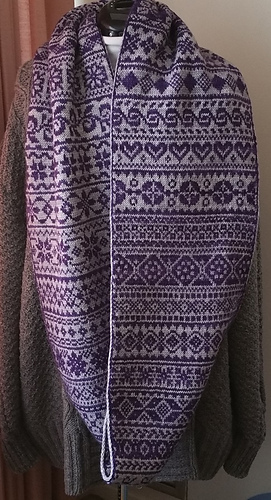patterns >  Wendy Knits
Wendy Knits
> Nordic Border Cowl II







Nordic Border Cowl II
This cowl is worked as a long tube: it starts with a provisional cast-on and is worked in the round in two-color stranded stockinette, then the live stitches at the end are grafted to the live stitches released from the provisional cast-on.
The approximate measurements are 80” around and 8.5 (11)” deep. While exact gauge is not crucial for a non-fitted garment, you want to get close to the stated gauge for the desired effect. The gauge listed is after blocking.
You can use any fingering weight smooth wool or wool blend: 840 (1260) yards of each color. I used Dragonfly Fibers Djinni Sock : 2 (3) skeins Silver Fox (background color) and 2 (3) skeins Heliotrope (foreground color). When choosing yarns, you want to ensure enough contrast between the two colors. I recommend using solid or heathered colors only: using a variegated colorway will obscure the pattern. The colors I chose are understated, but have enough contrast to show the design clearly. You could go for a more dramatic effect with bolder colors and strong contrast.
While the knitting instructions are written out, the colorwork design is charted only, and consists of different Nordic-style motifs: no two motif panels are repeated in the cowl. They are all smaller pattern motifs: border patterns.Some are traditional Nordic designs, some I made up, and some are a hybrid of traditional and made up.
The knitting itself is relatively simple: if you have done two-color stranded knitting in the round, you will have no difficulties with this pattern. While it looks complex, remember that you are only working one row at a time. There are few particularly long floats needed and because the wrong side of your work is inside the tube, you don’t have to worry about weaving your floats: just make sure to keep your stitches spread evenly and your tension loose as you change colors.
The design is presented in 12 large clear charts.
3956 projects
stashed
5551 times
- First published: January 2016
- Page created: January 6, 2016
- Last updated: February 5, 2025 …
- visits in the last 24 hours
- visitors right now




